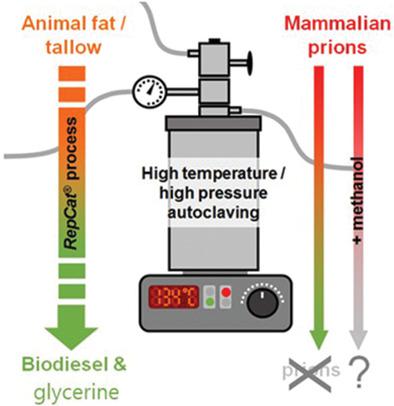当前位置:
X-MOL 学术
›
Eur. J. Lipid Sci. Technol.
›
论文详情
Our official English website, www.x-mol.net, welcomes your feedback! (Note: you will need to create a separate account there.)
Influence of Methanol on Prion Reduction during High Temperature and High Pressure Oleochemical Processes
European Journal of Lipid Science and Technology ( IF 2.7 ) Pub Date : 2020-08-05 , DOI: 10.1002/ejlt.202000136 Behnam Mohammadi 1 , Robert Raudner 2 , Mohsin Shafiq 1 , Edgar Ahn 2 , Hermann C. Altmeppen 1 , Markus Glatzel 1
European Journal of Lipid Science and Technology ( IF 2.7 ) Pub Date : 2020-08-05 , DOI: 10.1002/ejlt.202000136 Behnam Mohammadi 1 , Robert Raudner 2 , Mohsin Shafiq 1 , Edgar Ahn 2 , Hermann C. Altmeppen 1 , Markus Glatzel 1
Affiliation

|
Prion‐reduction in standard biodiesel processes is caused by acidic and alkaline conditions. In the alternative RepCat biodiesel process, efficient prion‐reduction can be achieved by high‐temperature/pressure. However, a possible increase in thermostability of prions in the presence of methanol during these conditions has not previously been investigated, and is verified in this work. Samples are spiked with prions, treated with methanol, and incubated at 220 °C at 80 bar for 30 min. No traces of protease‐resistant prion protein (as proxy for prions) are detected in tallow or glycerine (as the final by‐product) after treatment. Serial dilutions of spiked prions show at least 6 log10 prion reduction. More importantly, similar effects are detected using milder conditions of 200 °C at 70 bar for 15 min, representing the worst‐case conditions of the process. In conclusion, this study shows that methanol does not increase the thermostability of prions and the RepCat process can efficiently eliminate prions and is therefore safe for the usage of category 1 tallow.
中文翻译:

甲醇对高温高压石油化学过程中Pri离子还原的影响
标准生物柴油工艺中的on减少是由于酸性和碱性条件引起的。在替代RepCat生物柴油工艺中,可以通过高温/高压实现有效的病毒还原。但是,以前没有研究过在这些条件下在甲醇存在下of病毒的热稳定性可能增加的情况,这项工作已得到证实。样品中掺入病毒,用甲醇处理,然后在220°C和80 bar下孵育30分钟。治疗后在牛脂或甘油(作为最终副产物)中未发现任何抗蛋白酶的pr病毒蛋白(作为病毒的替代物)。加标病毒的系列稀释液至少显示6 log 10减少ion病毒。更重要的是,在200°C和70 bar的较温和条件下进行15分钟检测到类似的效果,这代表了该过程的最坏情况。总而言之,这项研究表明甲醇不会增加of病毒的热稳定性,并且RepCat工艺可以有效消除eliminate病毒,因此对于使用1类牛脂是安全的。
更新日期:2020-08-05
中文翻译:

甲醇对高温高压石油化学过程中Pri离子还原的影响
标准生物柴油工艺中的on减少是由于酸性和碱性条件引起的。在替代RepCat生物柴油工艺中,可以通过高温/高压实现有效的病毒还原。但是,以前没有研究过在这些条件下在甲醇存在下of病毒的热稳定性可能增加的情况,这项工作已得到证实。样品中掺入病毒,用甲醇处理,然后在220°C和80 bar下孵育30分钟。治疗后在牛脂或甘油(作为最终副产物)中未发现任何抗蛋白酶的pr病毒蛋白(作为病毒的替代物)。加标病毒的系列稀释液至少显示6 log 10减少ion病毒。更重要的是,在200°C和70 bar的较温和条件下进行15分钟检测到类似的效果,这代表了该过程的最坏情况。总而言之,这项研究表明甲醇不会增加of病毒的热稳定性,并且RepCat工艺可以有效消除eliminate病毒,因此对于使用1类牛脂是安全的。

























 京公网安备 11010802027423号
京公网安备 11010802027423号